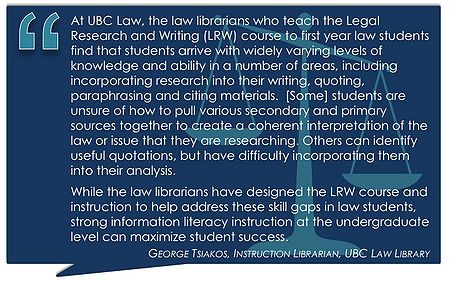Library:Faculty Information Literacy Toolkit/Using Information
Using
In the spring of 2013, learning and assessment librarians from the UBC Library met with groups of first year students to ask them about their experience and understanding of research as their first term of studies drew to a close. The conversations between the students and librarians revealed quite a lot about how students approach research at the beginning of their academic careers.
There are five fundamental elements to the research skills students need to learn in order to succeed in first year and beyond. This video introduces the element of using information.
Using here refers to students using pertinent information in their work in the form of quotes, paraphrases, and other formats; using appropriate citation; using extracted information in support of topic/stance(s); synthesizing new ideas from analysis of the ideas in the information sources they have read; and showing that they can situate their own work within the discourse of the topic/discipline.
Tips to Address Using Information for Research
Requiring and/or Grading Citations
“Citation is an art, not a science. As budding artists, we learn the principles — from color and form to shape and texture. Once we have mastered the basics, we are free to improvise. Through that improvisation, we capture the uniqueness of each subject or setting. As historians, we use words to paint our interpretations of past societies and their surviving records. In order to portray those records, we learn certain principles of citation…” -Elizabeth Shown Mills, Evidence Explained

Citation grading is a complicated aspect of the research assignment, as reasons for assigning grades can vary. Consider:
- Am I measuring students’ ability to be detail-oriented?
- Am I measuring the findability of their resources?
- Am I measuring student readiness to enter into the academic discourse by their use and respect of the work of other researchers?
Students spend a larger proportion of their time on citing than is reflected in the percentage of their grade it makes up - sometimes because they feel this is the only binary “right or wrong” aspect of their grade that they can control. Carefully considering and emphasizing the purpose behind citation requirements can help students understand these requirements, and encourage them to budget their time more effectively on other parts of their research.
Consider Citation Expectations and Skill Levels
While citations can be complicated, students' lack of understanding around the very elements of a citation (e.g journal title, year, number, etc.) is often at the root of their frustration when formatting their papers.
There are several ways to work with students on citation related questions:
- Provide instruction on the elements of citations.
- Encourage peer proofreading of citations.
- Provide access to online resources to assist students in learning about how to cite.